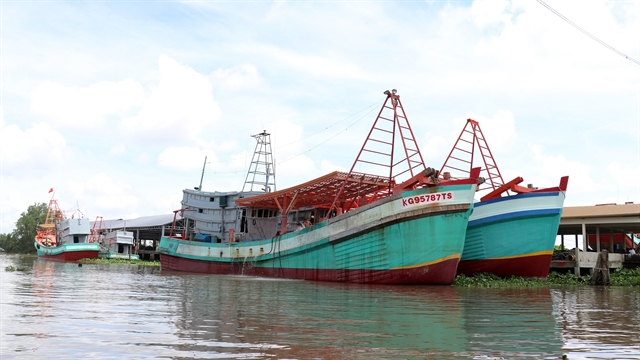 Society
Society

 |
| Fishing boats dock on the Cái Bé River in Kiên Giang Province’s Châu Thành District. – VNA/VNS Photo Lê Huy Hải |
KIÊN GIANG – Kiên Giang Province expects to produce 844,400 tonnes of seafood this year, 5 per cent more than the original target, according to its Department of Agriculture and Rural Development.
Fishing will account for 523,900 tonnes and aquaculture for 320,500 tonnes.
The Cửu Long (Mekong) Delta province’s brackish-water shrimp harvest will be 111,600 tonnes, up 7 per cent from last year.
Lê Hữu Toàn, deputy director of the department, said at the end of last year the province had expected the fishing industry to face difficulties because of a possible increase in the prices of fuel and inputs this year.
Besides, fisheries resources are declining, he said.
So his department decided to increase aquaculture production this year, he added.
The department has encouraged farmers to breed high-value fish and other aquatic species such as shrimp, crabs, blood cockles and sweet snails.
With a coastline of more than 200km, 143 small and large islands, and more than 100 river mouths, the province has enormous potentials for marine aquaculture, which is now done mostly in floating cages in Kiên Hải and Kiên Lương districts and Phú Quốc and Hà Tiên cities.
The province has more than 3,600 floating cages at sea.
More and more local farmers bred freshwater fish in inundated rice fields this year during the flooding season that is coming to a close.
Farmers have switched from growing three rice crops a year to two crops and breeding aquatic creatures to increase their incomes and also prevent rice diseases.
The province has restructured its fishing towards sustainable development and is determined not to increase the number of fishing boats.
It has 3,666 off-shore fishing boats with a length of at least 15m.
They have black boxes installed to monitor fishing activities which help prevent illegal, unreported and unregulated fishing, according to the department.
This year the fuel prices are high and there is a shortage of workers, but fishing boat owners have overcome the difficulties and exceeded the target, the department said.
The province has reorganised fishing by reducing near-shore fishing and reduced destructive activities to protect seafood resources.
It has encouraged those who used to fish close to shore to switch to other jobs such as farming aquatic species, trading and services. – VNS




